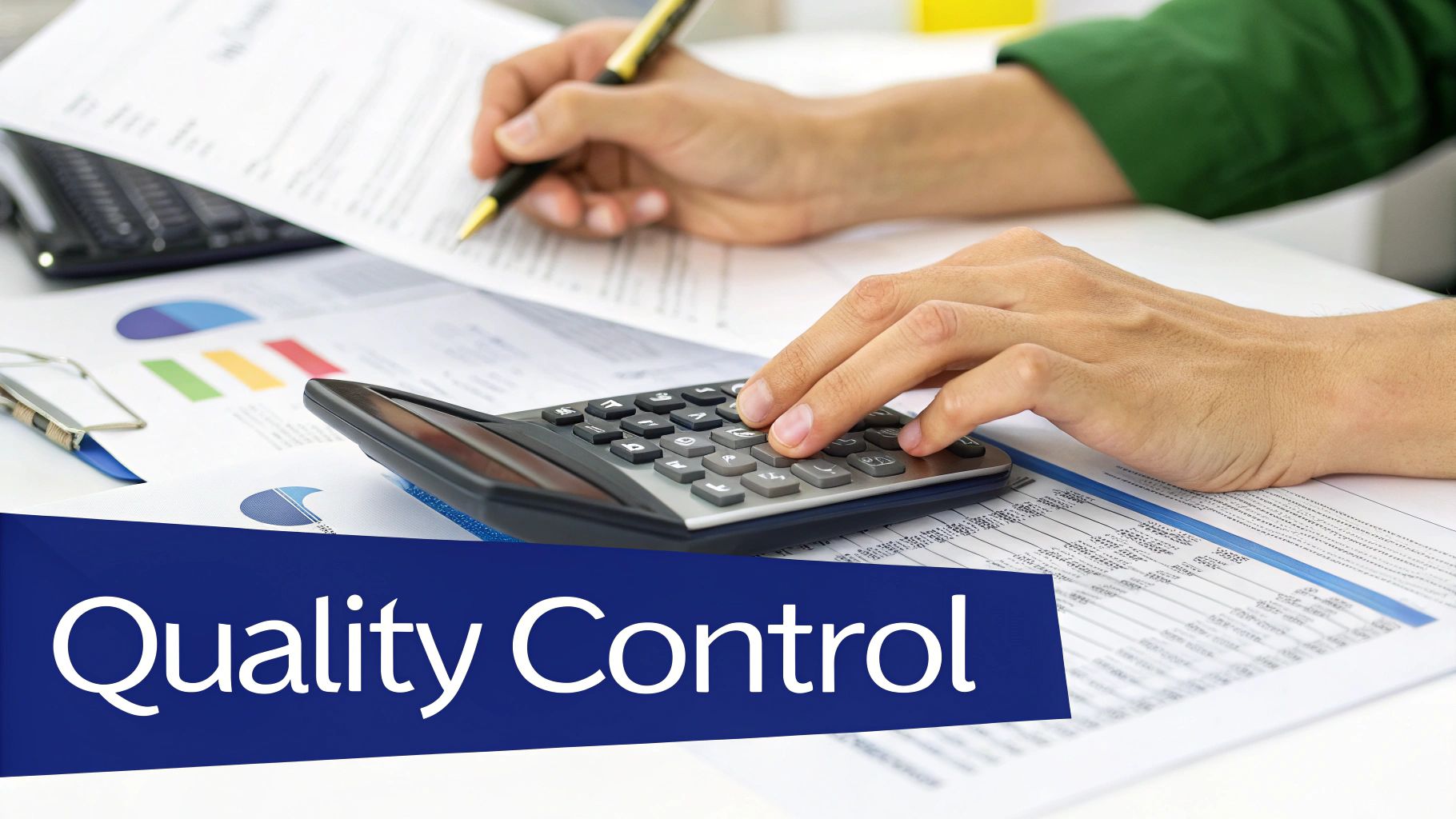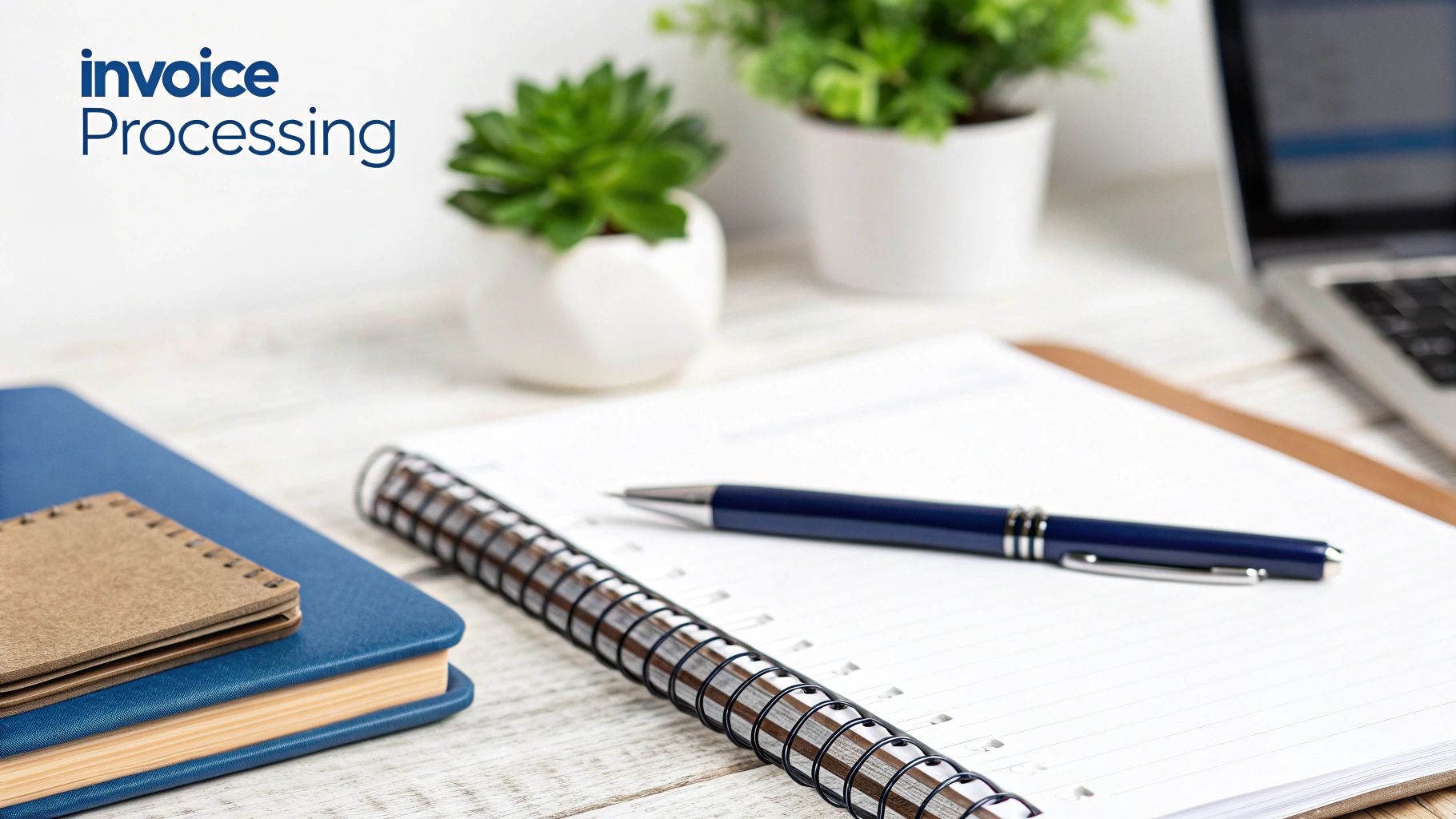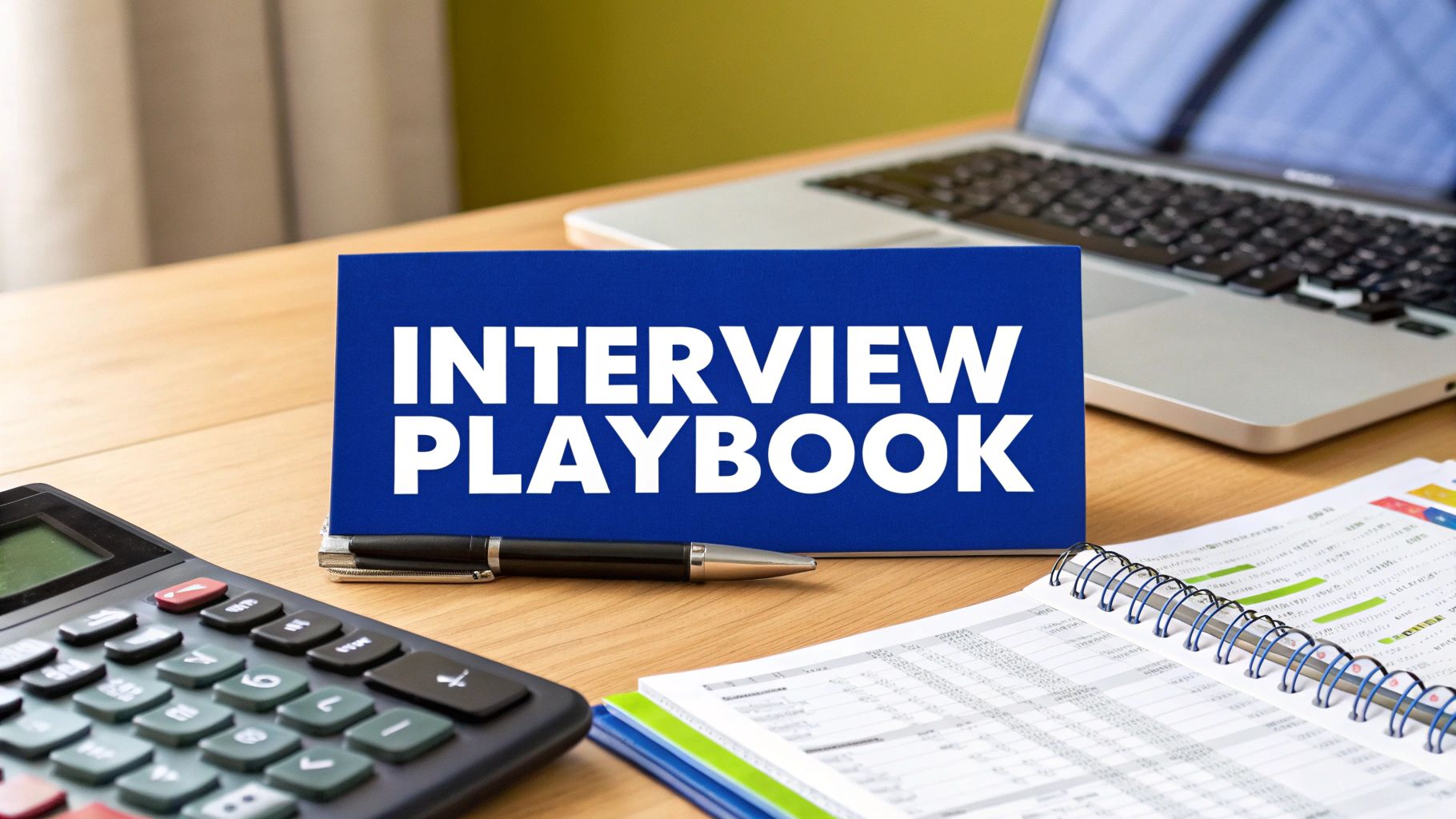Walking into an interview for an accounting assistant role can feel daunting. The questions you'll face are designed to test not just your knowledge of debits and credits, but your attention to detail, ethical judgement, and problem-solving abilities. In today's competitive job market, especially for sought-after remote positions, preparation is paramount. Employers are looking for candidates who can seamlessly integrate into their teams, demonstrate technical proficiency, and handle sensitive financial data with the utmost integrity.
This guide breaks down eight of the most common and critical accounting assistant interview questions you're likely to encounter. We'll go beyond generic advice, providing you with the 'why' behind each question, expert tips for structuring your answers, and what hiring managers are truly assessing.
By understanding their perspective, you can frame your experience to showcase yourself as the precise, reliable, and skilled professional they need. Our goal is to equip you with the confidence and strategy to not just answer the questions, but to tell a compelling story about your value as an accounting professional. We will explore how to best articulate your experience with key tasks like managing accounts payable and receivable, ensuring data accuracy, and using various accounting software platforms.
1. Tell me about your experience with accounting software
This is one of the most fundamental accounting assistant interview questions you will face. Hiring managers ask this to gauge your technical competency and determine if your skills align with the systems they use daily. Your answer reveals not just what you know, but how you apply your knowledge to real-world accounting tasks like data entry, reconciliations, and reporting.

A strong answer goes beyond simply listing software names. It should demonstrate the depth of your experience and connect it to tangible business outcomes.
How to Structure Your Answer
When preparing your response, aim for a detailed and structured narrative. Focus on the software most relevant to the job description first.
- Name Specific Platforms: Mention the exact software you've used (e.g., QuickBooks Online, Sage 50, Xero, Microsoft Dynamics). Be specific about versions if you can (e.g., "QuickBooks Desktop Pro 2021").
- Describe Your Tasks: Explain the functions you performed. Did you manage accounts payable and receivable? Process payroll? Generate financial statements like the Profit & Loss or Balance Sheet?
- Quantify Your Achievements: Whenever possible, use numbers to illustrate your impact. For instance, mentioning that you "processed over 200 invoices weekly with 99.8% accuracy" is more powerful than saying you "handled invoicing".
- Include Excel Proficiency: Don't forget Microsoft Excel. Detail your skills with essential functions like VLOOKUP, SUMIF, pivot tables, and financial modelling. These are core tools for any accounting professional.
Key Insight: Employers are looking for candidates who can hit the ground running. By detailing how you used software to improve efficiency or accuracy in a previous role, you demonstrate your immediate value and problem-solving abilities.
Example Answer
"In my previous role at ABC Ltd, I extensively used QuickBooks Online for three years. I was responsible for the entire accounts payable and receivable cycle, including creating and sending invoices, processing supplier payments, and performing weekly bank reconciliations for three separate accounts. I also managed the monthly payroll run for 25 employees through QuickBooks Payroll.
Additionally, I am highly proficient in Microsoft Excel. I frequently used VLOOKUPs and pivot tables to analyse sales data and prepare monthly performance reports for management, which helped identify a 15% cost-saving opportunity in our supply chain. I am a quick learner and confident in my ability to adapt to new systems, such as the Sage software I see you use here."
2. How do you ensure accuracy in your work?
This is a cornerstone of all accounting assistant interview questions. Recruiters ask this to evaluate your attention to detail, your systematic approach to quality control, and your commitment to maintaining financial integrity. Your response demonstrates your understanding that even small errors in accounting can have significant consequences.

A strong answer moves beyond a simple "I double-check everything." It outlines a specific, repeatable process that showcases your reliability and conscientiousness.
How to Structure Your Answer
Detail the specific methods and habits you use to prevent, detect, and correct errors. This shows a proactive and organised mindset.
- Describe Your System: Explain your personal checking process. Do you set aside specific times for review? Do you use checklists for month-end closing procedures? Do you cross-reference source documents (like purchase orders and receipts) against entries in the accounting system?
- Give Specific Examples: Talk about a time when your process caught a mistake. This could be a duplicate invoice, an incorrect payment amount, or a miscategorised expense. Explaining how you identified and rectified it provides tangible proof of your skills.
- Mention Tools: Reference any tools you use, even simple ones. This could include using formulas in Excel to verify totals, running reconciliation reports in accounting software, or using a physical calculator to double-check manual entries.
- Balance Speed and Accuracy: Acknowledge the need for efficiency but emphasise that accuracy is paramount. Explain how your methods allow you to work quickly without sacrificing quality.
Key Insight: Employers are looking for candidates who are methodical and trustworthy. Describing a clear, logical system for ensuring accuracy proves you can be trusted with sensitive financial data and won't require constant supervision.
Example Answer
"I believe a systematic approach is key to ensuring accuracy. For every task, especially data entry, I have a two-step verification process. First, I cross-reference the data I've entered against the source document immediately after inputting it. Second, at the end of each day, I run a summary report to spot any anomalies or figures that seem out of place.
At my previous firm, this process helped me identify a £2,500 duplicate payment to a supplier that was missed by the initial approval. I flagged it, reversed the duplicate entry, and implemented a checklist for the payables run to prevent it from happening again. I understand that accuracy is one of the most important employee performance metrics in an accounting role, and I've built robust habits to maintain a high standard in my work."
3. Describe your experience with accounts payable and receivable
This is a cornerstone of accounting assistant interview questions, as it directly probes your hands-on experience with the lifeblood of a company's cash flow. Hiring managers ask this to evaluate your understanding of the complete transaction cycle, from initial purchase orders and sales invoices to final payments and collections. Your answer demonstrates your meticulousness and grasp of fundamental accounting principles.

A comprehensive answer will detail your specific duties within both accounts payable (AP) and accounts receivable (AR), showing you can manage both sides of the ledger effectively.
How to Structure Your Answer
Detailing your process and results is key. Explain how you handled the day-to-day tasks and contributed to the financial health of the organisation.
- Detail AP Processes: Explain your experience with supplier invoices, including three-way matching (matching invoices to purchase orders and goods received notes), processing payments, and managing supplier relationships.
- Explain AR Functions: Describe how you created and issued customer invoices, tracked payments, and followed up on overdue accounts. Mention your familiarity with creating ageing reports.
- Quantify Your Workload: Use metrics to add weight to your experience. For example, "managed an AR ledger of over 300 active clients" or "processed approximately 250 supplier invoices weekly with a 99.5% accuracy rate".
- Showcase Problem-Solving: Mention how you handled discrepancies, resolved billing disputes, or improved the collections process. This highlights your critical thinking and communication skills, which are crucial qualifications for bookkeeping roles.
Key Insight: Employers value candidates who understand that AP and AR are not just data entry tasks. They are critical functions that directly impact a company's cash flow, profitability, and business relationships. Frame your experience to reflect this strategic understanding.
Example Answer
"In my role at XYZ Corp, I was responsible for the end-to-end accounts payable and receivable functions. For AP, I managed the processing of over 200 supplier invoices per week, ensuring each was correctly coded and authorised before payment runs. I also performed monthly supplier statement reconciliations to resolve any discrepancies promptly.
On the AR side, I was in charge of invoicing for around 150 clients and managed the credit control process. I produced weekly aged debtor reports for management and was responsible for collections, successfully reducing the average debtor days from 45 to 32 within my first year. I pride myself on maintaining positive relationships with both suppliers and customers while ensuring timely payments."
4. How do you handle confidential financial information?
Trustworthiness is non-negotiable in an accounting role. This is one of the most critical accounting assistant interview questions because it directly assesses your understanding of data security, professional ethics, and legal compliance. Your response shows the interviewer whether you can be trusted with sensitive company and client data, such as payroll details, financial statements, and bank information.

A strong answer demonstrates a proactive and systematic approach to confidentiality. It should convey that you treat data security as an integral part of your responsibilities, not an afterthought.
How to Structure Your Answer
Your answer should blend principle with practice. Show that you understand why confidentiality is important and how you ensure it in your daily work.
- Acknowledge the Importance: Start by stating your firm understanding of the sensitive nature of financial data and the professional responsibility to protect it.
- Mention Specific Policies: Refer to concrete practices you have followed. This could include clean desk policies (locking away physical documents), using secure password managers, and adhering to strict access control protocols.
- Discuss Digital Security: Talk about your digital habits. Mention things like locking your computer when away from your desk, using two-factor authentication, and being cautious about phishing emails or discussing sensitive information over unsecured channels.
- Reference Compliance and Training: If you have received any training on data protection regulations like GDPR or have experience working in a regulated environment, be sure to mention it. This shows a formal understanding of your legal obligations.
Key Insight: Employers need assurance that you are a low-risk hire who will protect their most valuable assets. Highlighting specific, ingrained habits for data security makes you a much more compelling candidate than someone who gives a generic answer about being "trustworthy".
Example Answer
"I take the responsibility of handling confidential financial information very seriously. In my previous role at XYZ Corp, I strictly followed the company's data security protocols. This included operating on a 'need-to-know' basis and never discussing sensitive client details in public areas.
On a practical level, I always maintained a clean desk policy, ensuring all physical documents were securely filed and locked away at the end of each day. Digitally, I used a password manager to maintain strong, unique passwords for different systems and always locked my workstation when stepping away. I have also completed GDPR awareness training, so I am familiar with the principles of data minimisation and lawful processing. I understand that maintaining confidentiality is fundamental to the integrity of the accounting function and the trust the company places in me."
5. Describe a time when you found an error in financial records
This is one of the most revealing behavioural accounting assistant interview questions you can be asked. The interviewer wants to assess your attention to detail, problem-solving skills, and integrity. How you handle mistakes, especially those you discover yourself, speaks volumes about your character and professional diligence.
A great answer showcases your analytical process and your commitment to financial accuracy. It demonstrates that you are not just a data entry clerk, but a proactive member of the finance team dedicated to maintaining the integrity of the company's books.
How to Structure Your Answer
The best way to tackle this question is by using the STAR method (Situation, Task, Action, Result) to create a clear and compelling story.
- Situation: Briefly set the scene. What were you working on? For example, "During the monthly bank reconciliation..." or "While preparing the quarterly VAT return...".
- Task: Explain your objective. What was the specific goal? For instance, "My task was to reconcile the cash account and investigate any discrepancies."
- Action: Describe the specific steps you took. This is the core of your answer. Detail your "detective work," such as cross-referencing invoices, checking payment records, or reviewing general ledger entries. Mention who you communicated with, like your line manager.
- Result: Explain the outcome. Did you recover funds, correct a critical report, or prevent a future error? Quantify the result if possible (e.g., "identified a £5,000 duplicate payment which was successfully recovered"). Also, mention what you learned or how you helped improve a process.
Key Insight: Employers value candidates who not only find problems but also think critically about how to prevent them from recurring. Highlighting any process improvements you suggested shows initiative and a forward-thinking mindset.
Example Answer
"In my last role, I was responsible for processing supplier invoices. While performing the weekly payment run, I noticed an invoice for £7,500 from a regular supplier that seemed unusually high. My task was to verify its legitimacy before processing the payment.
I took the initiative to investigate. First, I cross-referenced the purchase order number against our internal system and saw it matched a previous invoice we had already paid two weeks prior. I then contacted the supplier's accounts department, who confirmed it was a duplicate invoice sent in error. I documented the finding, voided the duplicate invoice in our system, and informed my manager of the situation and the £7,500 saving. As a result, we implemented a new cross-checking step in our process to catch potential duplicates before they reach the payment run stage, which I helped to document."
6. How do you prioritise tasks during busy periods like month-end closing?
This is a critical accounting assistant interview question designed to assess your organisational skills, ability to perform under pressure, and understanding of the accounting cycle. Hiring managers want to know if you can handle the high-stakes environment of a period-end close without compromising accuracy. Your answer demonstrates your reliability and strategic thinking.
A well-structured response shows you have a systematic approach rather than just reacting to pressure. It proves you can manage competing deadlines effectively while maintaining clear communication with the wider team.
How to Structure Your Answer
Your answer should illustrate a clear, logical process for managing your workload. Show the interviewer that you are proactive, not reactive, when faced with tight deadlines.
- Acknowledge the Importance: Start by recognising the critical nature of period-end closing and the need for meticulous planning.
- Describe Your Method: Detail your prioritisation strategy. Do you use a checklist, a project management tool like Trello or Asana, or a specific framework like the Eisenhower Matrix (Urgent/Important)?
- Emphasise Communication: Explain how you communicate with colleagues and managers. Mention confirming deadlines, providing status updates, and proactively flagging any potential issues. This shows you are a team player.
- Provide a Concrete Example: Talk through how you applied your method in a previous role. For instance, describe how you created a personal month-end checklist with deadlines for tasks like journal entries, accruals, and reconciliations.
Key Insight: Employers are looking for candidates who can bring order to chaos. Highlighting your ability to create and follow a structured plan, communicate effectively, and remain flexible shows you can be a stabilising force during the most demanding times of the accounting calendar.
Example Answer
"I understand that month-end closing is a high-pressure period requiring exceptional organisation. In my previous position, I developed a systematic approach to manage my responsibilities. At the beginning of the final week, I would create a detailed personal checklist, breaking down all my tasks, such as completing bank reconciliations, posting accrual and prepayment journals, and assisting with variance analysis.
I would then prioritise these tasks based on their deadlines and dependencies. For example, I knew that completing bank reconciliations was a prerequisite for several other closing activities, so I would always tackle that first. I also made it a point to provide a daily progress update to the Financial Controller to ensure everyone was aligned. This proactive communication helped us identify and resolve a discrepancy in inter-company transactions a day ahead of schedule, preventing a last-minute panic. I believe that a structured approach is key to streamline business processes and ensure a smooth close."
7. What experience do you have with financial reporting and analysis?
This is a more advanced accounting assistant interview question designed to test your analytical capabilities. Employers want to see if you can move beyond simple data entry and contribute to the bigger picture. Your response should show that you understand how raw financial data is transformed into actionable reports that guide business strategy.
This question separates candidates who simply process transactions from those who can interpret them. A strong answer will demonstrate your ability to provide insights that support management in making informed decisions.
How to Structure Your Answer
A good response will detail your hands-on experience with creating and interpreting financial reports. Focus on showing how your work provided tangible value.
- Mention Specific Reports: Name the exact reports you have prepared or contributed to, such as Profit & Loss statements, Balance Sheets, cash flow forecasts, or monthly variance reports comparing actual spending against the budget.
- Describe Your Analytical Process: Explain how you approached the analysis. Did you investigate discrepancies, identify trends, or highlight anomalies? For example, did you analyse expense trends to find potential cost-saving opportunities?
- Highlight the Tools You Used: Be specific about the software you used for analysis. Proficiency in Microsoft Excel is crucial, so mention skills like creating pivot tables, charts, and using formulas. If you have experience with tools like Power BI or Tableau, definitely include it.
- Connect to Business Decisions: The most important part is explaining the "why". Show that you understand how these reports are used. For example, explain how a cash flow forecast you prepared helped management plan for a large upcoming capital expenditure.
Key Insight: Hiring managers are looking for analytical potential. Even if your role was junior, showcasing an understanding of how your reporting tasks influenced business decisions demonstrates a higher level of commercial awareness and makes you a more valuable candidate.
Example Answer
"In my role at XYZ Corp, I was responsible for assisting the financial controller with month-end reporting. I prepared the initial draft of the monthly variance report, comparing our actual results to the budget. This involved extracting data from Xero and using Excel pivot tables to categorise and summarise expenses.
On one occasion, I noticed a consistent 20% overspend in our marketing category for three consecutive months. I highlighted this in my summary notes for the controller, who then used this information to discuss budget allocation with the marketing department. I also have experience creating weekly cash flow projections using Excel, which gave management a clear view of our liquidity and helped them schedule supplier payments more effectively. I am very comfortable transforming data into clear, easy-to-understand reports."
8. How do you stay current with accounting regulations and best practices?
This is one of the more forward-looking accounting assistant interview questions. Interviewers ask this to gauge your commitment to professional development and your awareness of the ever-changing regulatory landscape. Your answer demonstrates your proactivity and understanding that accounting is a dynamic field, not a static one.
Answering well shows you take ownership of your professional growth and understand the importance of compliance. It signals that you are a candidate who will maintain high standards and adapt to new requirements, protecting the company from compliance risks.
How to Structure Your Answer
A convincing response will be specific and show genuine engagement with the accounting profession. Vague answers like "I read things online" will not be impressive.
- Mention Specific Resources: Name the journals, websites, or organisations you follow. Examples include publications from the Association of Accounting Technicians (AAT), ACCA's Accounting and Business magazine, or reliable online resources like AccountingWEB.
- Highlight Formal Learning: Discuss any continuing professional development (CPD) courses, webinars, or certifications you have completed or are pursuing. This shows a structured approach to learning.
- Connect Knowledge to Practice: Explain how staying current has helped you in a previous role. For instance, did learning about a new VAT rule help you correct a process?
- Show Community Engagement: Mentioning membership in professional bodies or participation in local accounting groups indicates you are invested in your career beyond the day-to-day tasks.
Key Insight: Employers are looking for candidates who are not just competent today but will remain competent tomorrow. Demonstrating a clear strategy for staying informed shows foresight and a commitment to quality, which is invaluable in an accounting role.
Example Answer
"I believe continuous learning is crucial in accounting, so I make a conscious effort to stay up-to-date. I am an AAT member and regularly read their industry updates and attend their webinars, particularly those focused on Making Tax Digital (MTD) and changes to VAT regulations. In my last role, my awareness of a new MTD for VAT requirement allowed me to help the team transition our record-keeping process smoothly, ensuring we were compliant ahead of schedule.
I also subscribe to newsletters from sources like AccountingWEB to get a broader view of industry news and best practices. I’m committed to my professional development and am always looking for opportunities to learn and apply new knowledge to ensure my work is accurate and compliant with the latest standards."
8 Key Accounting Assistant Interview Questions Comparison
Partnering for Success: Finding Your Ideal Accounting Professional
Navigating the hiring process for a crucial role like an accounting assistant requires more than just a list of questions; it demands a strategic approach to uncovering a candidate's true potential. By delving into the specific accounting assistant interview questions we have explored, you move beyond surface-level assessments and gain a comprehensive view of a candidate’s capabilities. You're not just looking for someone who can perform tasks; you are searching for a professional who will become an integral part of your financial framework.
The insights gained from these discussions-from software proficiency and meticulous accuracy to ethical judgement and a proactive learning mindset-are the building blocks of a high-performing finance team. Mastering how to answer these questions (for candidates) and how to evaluate them (for employers) is the key to making a successful and lasting match.
Key Takeaways for Employers and Candidates
For businesses, particularly small to medium-sized enterprises, the challenge is clear. You need to identify an individual who possesses not only the requisite technical skills but also the soft skills like communication, problem-solving, and adaptability. This is especially true when building a remote team, where self-discipline and cultural alignment are paramount for seamless integration.
For the Candidate: Your goal in the interview is to provide concrete, evidence-based answers. Use the STAR (Situation, Task, Action, Result) method to structure your responses, showcasing not just what you did, but why it mattered and the positive impact it had.
For the Employer: Your objective is to listen for depth. Does the candidate just list software they have used, or do they explain how they leveraged it to improve a process? Do they speak about accuracy in abstract terms, or do they detail the specific checks and balances they implement daily?
Your Actionable Next Steps
Securing the right talent is arguably the most significant investment a business can make. The process of sourcing, vetting, and interviewing candidates is incredibly time-consuming and often diverts focus from core business activities. This is where a strategic partnership can be a game-changer. Rather than sifting through countless applications, you can focus your energy on interviewing a pre-vetted shortlist of elite professionals.
At Beyond Hire, we specialise in precisely this. We connect businesses like yours with the top 1% of remote accounting professionals from South Africa, a talent pool renowned for its strong work ethic, exceptional skills, and cost-effectiveness. Our rigorous screening process evaluates every candidate on the critical competencies discussed throughout this article, ensuring they are ready to contribute from day one. By partnering with us, you can build a world-class remote finance team with confidence, achieving significant cost savings without compromising on quality. Let us handle the complexities of recruitment, so you can focus on welcoming your next exceptional team member.

